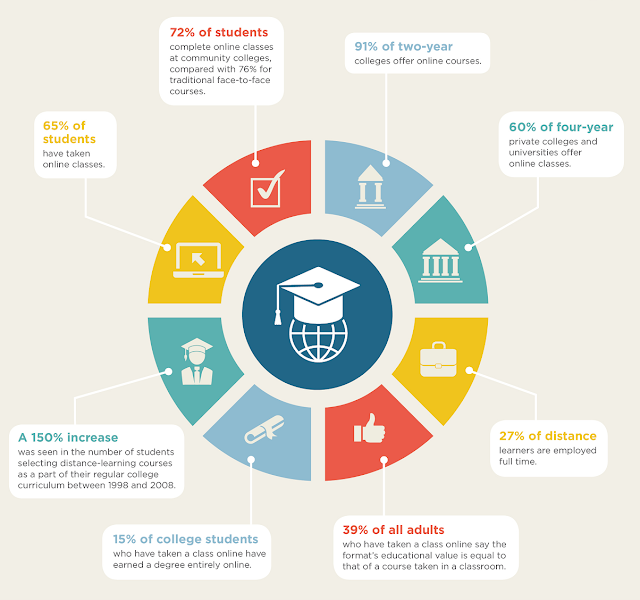Online learning - What is the importance of social engagement?
During my first years at the university I used to perceive
teachers as unsocial and always busy working on their important research work. Making
questions during lectures or even during the hour they specifically created to answer
students´ questions, would not cross my mind. I remember feeling that my
questions were never smart or relevant enough to be asked. My first two years
were therefore a struggle in terms of building my cognitive knowledge and my
grades were a mirror of my emotions reflecting the state of merely coping with the
academic environment.
Fortunately for me, by the end of my second year,
things started to change. The turning point was when I started studying with a
group of about eight to ten people. We would give each other the required
support to make us feel socially engaged and comfortable with academic
interactions. Even approaching teachers would not be as intimidating as it used
to be, and I started to realize that academic teachers were actually happy to
answer our questions and appreciated our interest. My grades improved considerably.
Based on my experience it is clear to me the
importance of social engagement. It is not just relevant to develop a comfortable
and safe environment but also to allow good and healthy academic interactions
which are the basis for deep learning. However, when moving from face-to-face
teaching to online, social engagement with the students can be particularly challenging.
D. Randy Garrison and his team initiated some research
to overcome this challenge by developing the Community of Inquiry framework (CoI)
[1] which was based on the concepts introduced by early philosophers C. S.
Pierce and J. Dewey. This framework emerged in the specific context of computer
conferencing in higher education and the goal of the work “was to provide a
conceptual framework that would provide order, heuristic understanding and a
methodology for studying the potential and effectiveness of computer
conferencing” [1]. The CoI is based on three stable elements which were later
shifted to a broader perspective of online learning. Those are: (i) Cognitive
presence, (ii) Social presence and (iii) Teaching presence. This framework
emphasizes the importance of the social interactions in the process of knowledge
acquisition as well as the process of inquiry, i.e. teaching, demonstrating and
reflecting on how students engage with teachers, other students and content while
learning [2].
 |
| Figure 1: Teachers engaging students in online learning [3]. |
As a researcher given my first steps in online
teaching, I don´t want to be perceived by my students as I used to perceive my
teachers during my first academic years. I want to use the tools and models
available now such as "Col" and the “five stage model” [4] and learn how to engage
and motivate the students to the course in a friendly, open and trustworthy atmosphere.
I want to support and ensure a healthy social engagement of the students,
because only with this support can students build strong relationships with
other students, teachers and knowledge. And to do that, one of the most
important things to do is to set the example.
As Marti Cleveland-Innes stressed [5], it is very important,
as a teacher, to “set yourself as human” in the sense that teachers need to be
able to show their emotions to set the tone and give space and confidence for
the students to do the same.
References
[1] Garrison, D. R.; Anderson,
T.; Archer, W. 2010 The first decade of community of inquiry framework: A
retrospective. Internet and Higher Education, Vol. 13, p 5-9
[2] Bektashi, L. 2018
Community of Inquiry framework in online learning: use of technology.
Pressbooks, Chapter 10. Available at: https://techandcurriculum.pressbooks.com/chapter/coi-and-online-learning/
Accessed on 01/12/2019
[3] Shutterstock,
Available at: http://www.forbesindia.com/article/darden-school-of-business/customer-engagement-4-types-and-new-maps/51459/1
Accessed on 01/12/2019
[4] Salmon, G. The five
stage model. Available at: https://www.gillysalmon.com/five-stage-model.html#
Accessed on 01/12/2019
[5] Cleveland-Innes, M.
2019 ONL192 Topic 4 Webinar 26 November. Available at: https://luplay.education.lu.se/media/ONL192+Topic+4+webinar+26+November/0_ay3rml01
Accessed: 30/11/2019


You describe you role as a learner based on the CoI model, and also show a clear example of the importance of social engagement and a group. You even describe that academic interactions as “the basis for deep learning”. This is very strongly put, and makes me want to know more about your insights of this.
ReplyDeleteYou describe that social engagement could be a challenge when teaching and learning online, and describe the CoI framework as a solution. You say that you think you will use both the CoI framework and the five stage model in you teaching ahead. You also want to ensure a good emotional presence in your classes. This I am really looking forward to hearing more about in the future. What do you think will be some of your challenges? I hope this course will be a good starting base!
I can totally relate to your early university years experience. Unfortunately, I did not have a study group like yours and so I soldiered on for three whole years. Indeed, the emotional load of working alone was a heavy one. As the saying goes, many hands make the work lighter. This is certainly true of my ONL group. As we collaborated, ironing out our diverse cultural backgrounds, being inclusive and caring, complementing each other with our strengths, and contributing with ideas and technical know-how, the process became much easier and cognitively much more engaging and satisfying.
ReplyDelete